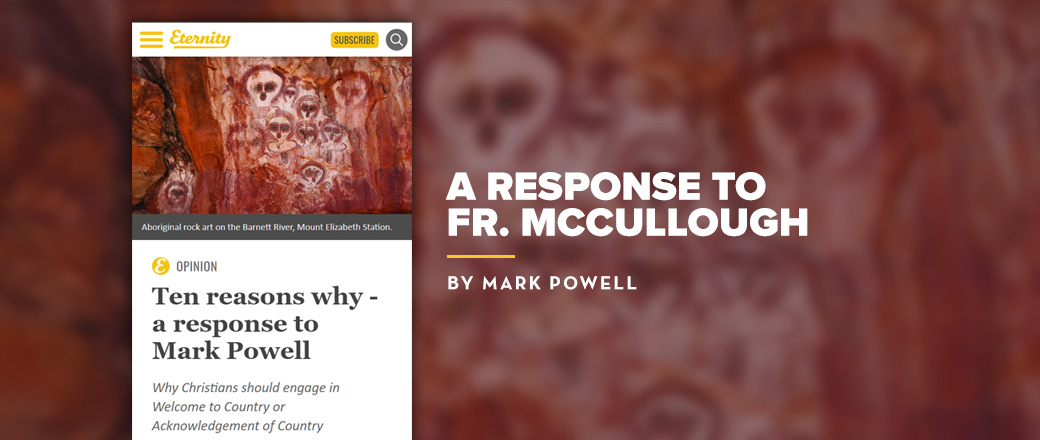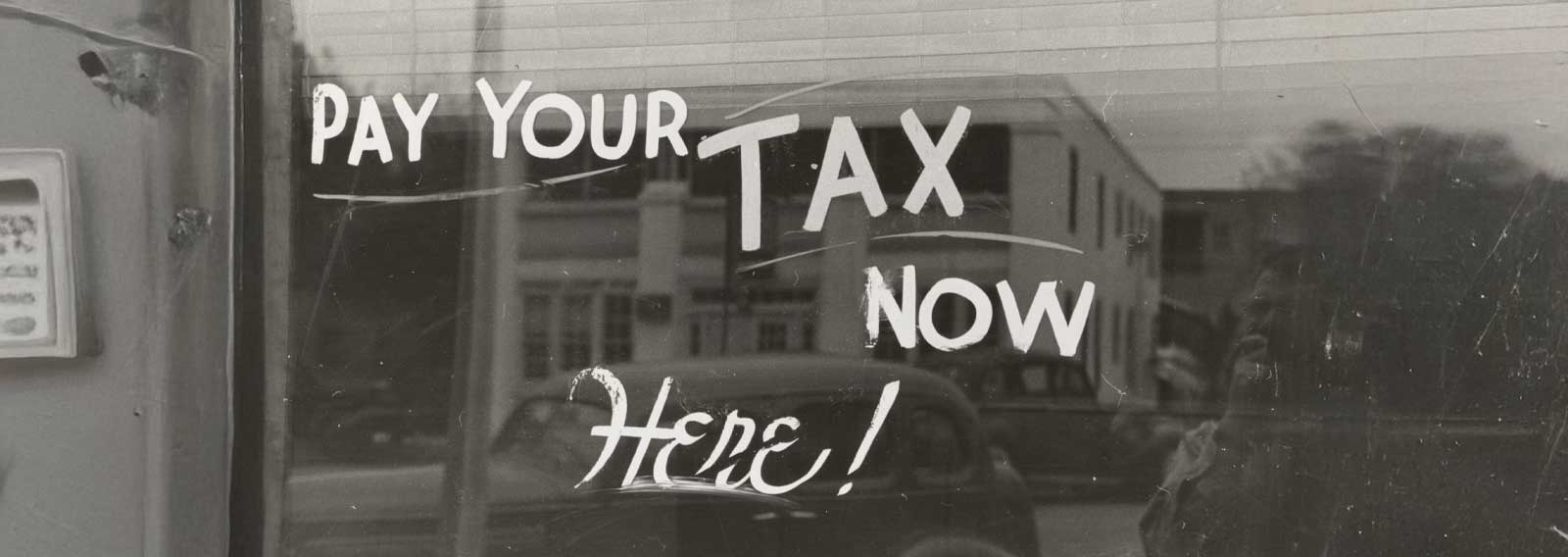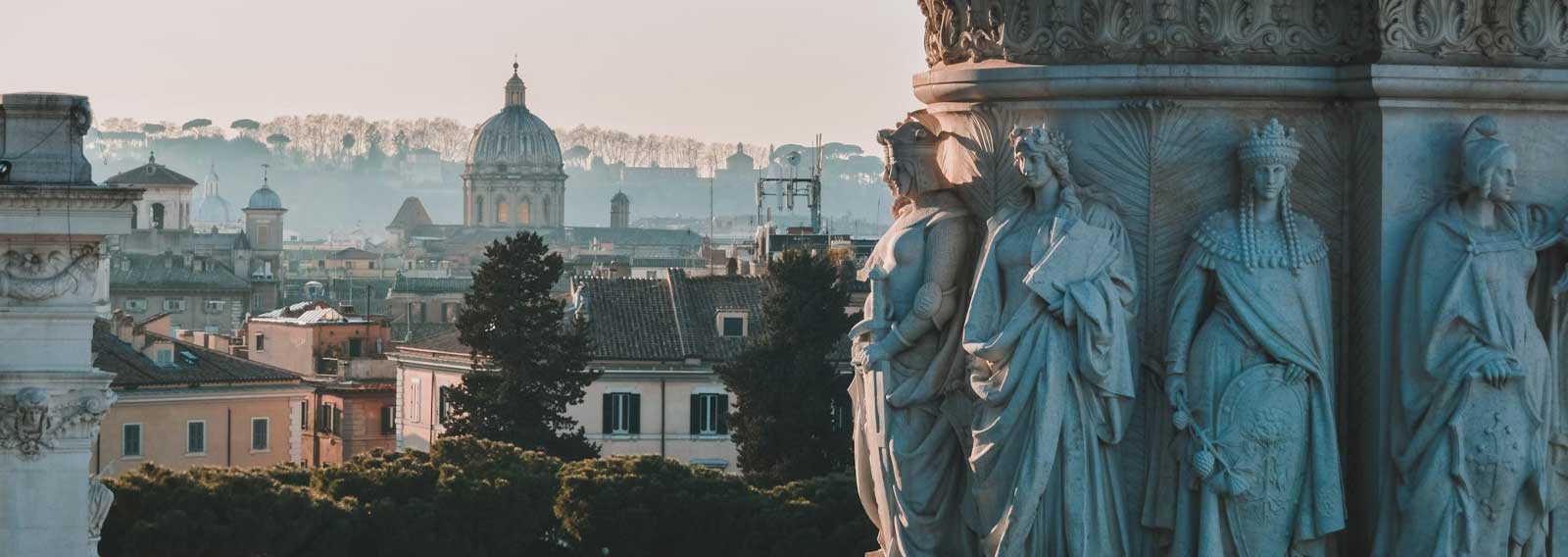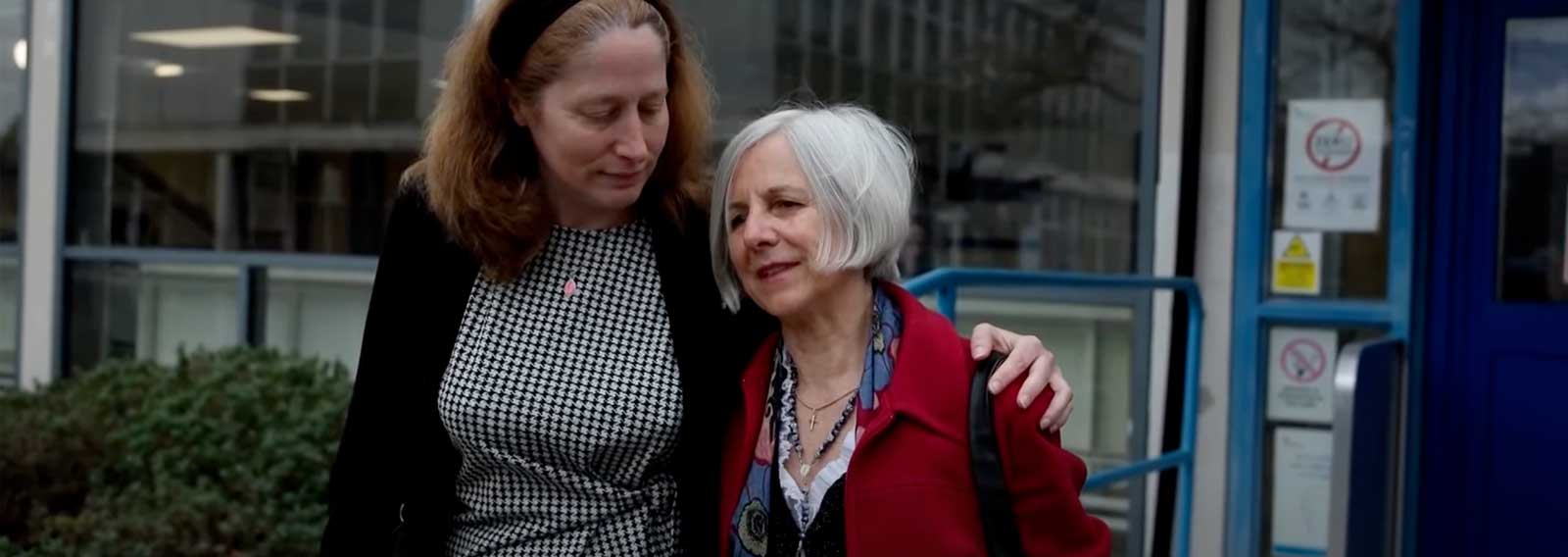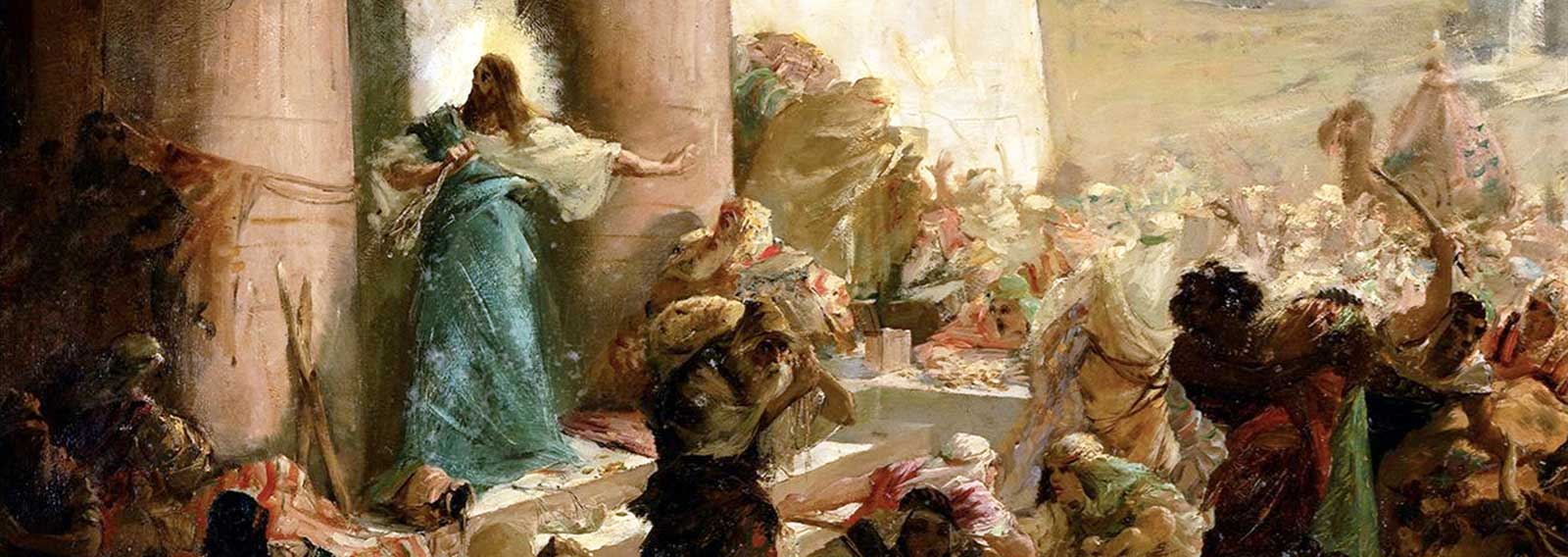Fr. Daryl McCullough—and Aboriginal Anglican priest from Western NSW—has written a turgid 4,000-word opinion piece in Eternity responding to my original 800-word article as to why Christian organisations should not engage in the use of indigenous protocols. He raises a number of significant concerns which I thought would be helpful to provide a response to help further clarify the issue (Proverbs 27:17).
At its recent General Assembly, the Presbyterian Church of Australia discussed the use of Welcome to Country and Acknowledgement of Country protocols. I was one of a significant number who expressed their personal concerns about doing so. The result was—in good Presbyterian fashion—that a committee was established and will be examining the issue and to bring back suitable recommendations in three years’ time when we next meet. So, this is very much a ‘live’ issue for us as a Christian denomination.
But first, I should give a quick personal explanation as to who I am. Unlike what some have accused—and many have assumed—me of being, I am not ‘white’, but a descendant of primarily South Sea Islanders, sometimes referred to as ‘Kanakas”, who were brought to Australia as ‘sugar slaves’ to work on the plantations in Queensland.
What’s more, I am married to a woman of Spanish migrant parents and pastor a multi-ethnic church. Before entering pastoral ministry, I completed an undergraduate degree in anthropology from the United States. All of which is to say, I am not unaware or personally unsympathetic to the many social injustices that have been done to people of different races in the past, and which tragically, continue to occur in the present.
For the sake of clarity, I will follow the structure of my original article in responding to Fr. McCullough’s numerous objections:
First, the issue of corporate worship. This is especially important for the Presbyterian Church who holds to something called the Regulative Principle of worship where all of our worship is shaped exclusively by the word of God.
Contrary to popular belief, there is very little evidence that “Welcome to Country” or “Acknowledgement of Country” ceremonies were part of traditional Aboriginal culture. Instead, The Australian reports that they were created in the mid-1970s by Ernie Dingo and Richard Walley. According to Dingo it also had a spiritual goal of protecting someone from the demonic:
…it had been a custom for Aboriginal people to “get the sweat from under their arms and rub down the side of your shoulders so any spirits around can smell the perspiration or the odour of the local, and say, he’s right, leave him alone”.
McCullough refers to an example of an Acknowledgement of Country provided by the National Aboriginal Bishop, Chris McLeod. I was not privy to this before writing my piece but it is precisely why I am so concerned. Note carefully what the statement actually says:
We acknowledge that God is sovereign over all land. Everything in heaven and earth belongs to God. We acknowledge the Kaurna people as the traditional custodians of the Adelaide region in which this church is located, and we respect the spiritual relationship they have with their country.
Now, it is indeed admirable that this particular “Acknowledgement of Country” makes reference to God as the sovereign creator—in my experience, there is normally no reference to God at all—but what does it mean that “and we respect the spiritual relationship they have with their country”? Because according to the Aboriginal website, Creative spirits:
For Aboriginal peoples, country is much more than a place. Rock, tree, river, hill, animal, human – all were formed of the same substance by the Ancestors who continue to live in land, water, sky. Country is filled with relations speaking language and following Law, no matter whether the shape of that relation is human, rock, crow, wattle. Country is loved, needed, and cared for, and country loves, needs, and cares for her peoples in turn. Country is family, culture, identity. Country is self.
They have a profound spiritual connection to land. Aboriginal law and spirituality are intertwined with the land, the people and creation, and this forms their culture and sovereignty.
This is pantheism, pure and simple. And according to Romans 1:18-25 it is a sign of the universal problem with mankind where in our sinful rebellion we worship the creation and not the creator. Hence, any kind of ‘spiritual’ relationship that Aboriginal people have had, or continue to have, with the land is idolatrous and as such will result in the wrath of God. Why would we then as Christians participate in acknowledging that?
What’s more, McCullough also says that smoking ceremonies are a “completely different topic”. But he then proceeds to state:
But to be clear, smoking ceremonies when done in the context of Christian worship are used as symbol of cleansing and of our prayers rising before the throne of God (Revelation 8:3-4), they have nothing to do with warding off evil spirits.
But this really proves the point that I was trying to make. Aboriginal smoking ceremonies are clearly spiritual in nature. Their goal is to explicitly ward off evil spirits. Just because they are done in the context of Christian worship doesn’t sanctify them. For example, see the article by Rodney Rivers regarding the spiritual danger of smoking ceremonies. Hence, we need to be extremely careful as to what elements we are using in our meetings lest we are guilty of offering to the LORD our God “unholy fire” (i.e. Leviticus 10).
Second, is the danger of spiritual syncretism. McCullough accuses me of having a “misinformed” and “rather insulting take on Aboriginal spirituality”. But the example that he uses—I think once again—proves my point for he refers to many Aboriginal groups worshipping “an ‘All Father’ Creator Spirit” which he implies is exactly the same figure as the God of the Bible. However, that is precisely what syncretism is – the fusion of diverse religious beliefs and practices!
In my original piece, I referred to an article by Brooke Prentis in which she referred to Uluru as “one of the most sacred, most holy of places” as further evidence of syncretism. McCullough, though, believes that I have quoted her out of context and that my use of this example is “appalling”. But while Prentis believes that “all country [is] sacred” because “it holds the Creator’s story” she also states that “Uluru is a sacred place for the Anangu peoples.”
However, with the coming of Christ there are no longer any sacred places or things (see John 4:20-21). And while all of creation declares the glory of God (Psalm 19) it is difficult to read Prentis’ article and not see that some places in creation are more special or ‘sacred’ than others. What’s more, even a Presbyterian minister has defended her position by arguing that natural revelation is somehow or other ‘sacramental’, which for someone who is Protestant, is quite frankly bizarre theologically.
Third, was my parallel to ancestor worship. In regards to this point McCullough says:
The more I read of Mark’s article the less I believe he actually knows anything about Aboriginal people, our customs and beliefs…
The reason that there is a warning on TV programs which show Aboriginal people who had died is precisely because they are NOT still here and it is considered to be insensitive to show the persons (sic) image or speak of them directly because they are no longer here.
However, the prohibition against referring to deceased people by name or using their image is not just “insensitive” to many indigenous Australians but carries with it a real impact on the people concerned. For example, the Aboriginal website, Creative spirits, states:
The tradition not to depict dead people or voice their (first) names is very old. Traditional law across Australia said that a dead person’s name could not be said because you would recall and disturb their spirit. After the invasion, this law was adapted to images as well.
Now, the Presbyterian Church of Australia is governed by teaching and ruling “Elders” but this doesn’t mean that we remember them at the start of every church service! But when it comes to acknowledging Aboriginal Elders, maybe the question is, “Will there be any negative consequences for a failure to do so?” Thus, I argued that continually acknowledging Aboriginal ‘Elders’ past, present and emerging went beyond “honouring” them and was more akin to ancestor worship as still practised in many Asian cultures today.
Fourth, Biblical peace-making principles of forgiveness. It is difficult to know how to respond here because McCullough becomes quite personal in his attack and derogatory in his language. In particular, he seems to assume what my motivations politically might be and labels my reasoning as “racist” and my whole article as “appallingly misinformed”. So, it’s difficult to respond in a completely dispassionate way.
However, my basic point was that these ceremonies are “politically-correct” in that they are bringing a particular political ideology into the church. What’s more, if we are guilty of the crime of meeting “on land that was forcibly removed from others” then continually confessing that historical sin doesn’t aid reconciliation but actually prevents it. All of which led onto my next point…
Fifth, the political nature of language. Once again, McCullough accuses me of being motivated by politics. But my point was simply that we should understand that Welcome to Country ceremonies are political by nature, and that if we are serious about reconciliation then it is better to use Biblical language.
McCullough also believe that Aboriginal ‘Elders’ should be acknowledged in exactly the same way as Biblical ones. But this is another example of conflating two different belief systems (i.e. syncretism). What’s more, I am concerned with the idea of referring to Aboriginal Elders as ‘Traditional Custodians” of the land because we have all been given the responsibility of being stewards over God’s creation (Genesis 1:28-30; 9:1-7).
Sixth, was my point about guilt by association. My argument here was that “there is a growing pressure in our country to conform to a progressive social agenda involving identity politics”. But, ironically, how McCullough responds actually proves my point. He states:
To what extent are individuals within denominations responsible? They aren’t. No one believes that individuals should be in some way held accountable – however church bodies? You bet. Just as churches are being held responsible for historic child abuse…
Now, I believe that individuals should be held responsible. And if denominations were complicit in covering-up or facilitating any form abuse then they too should be held to account. But there is a massive assumption here that Christian churches were part of the problem rather than the solution regarding Aboriginal peoples. That is the point that I was simply trying to make.
Seventh, the necessity of financial reparation. After being accused of letting politics drive my argument, I found it more than a little ironic that McCullough comes out so strongly with a controversial political view of his own, namely, that the Australian government must enact a treaty with Aboriginal people. This is not the time to argue for or against that particular ‘solution’.
What I will say, though, is that McCullough is right that if you believe that you are in possession of “stolen land” as a result of an “invasion” then financial reparations are a logical ethical necessity. However, most Christians I interact with who regularly and enthusiastically use these indigenous protocols have no intention of ever doing so, especially not out of their own pocket, or to the monetary detriment of their own particular church or ministry.
Eight, undermining Gospel reconciliation. My concern here is that especially when it comes to the work of reconciliation, the Gospel must always remain central. Because it alone addresses our deepest spiritual need. Hence, not only should the Lord God Almighty be pre-eminent in our worship but we should also emphasise and acknowledge the idolatrous sinfulness of all mankind—including aboriginal people—as well as the subsequent need for all people everywhere to repent and trust in Christ for forgiveness. In contrast, various displays of virtue signalling will in reality do very little…
Ninth, the harm to Christian unity. I don’t think McCullough if fully aware of the negative effect that indigenous protocols have not just on many non-indigenous Australians, but more than a few Aboriginal Christians as well. Because what I have observed is that it creates an “us-and-them” mentality rather than reinforcing the more constructive theological truth that we are all one in Christ Jesus. This is why I said that using indigenous protocols is like rebuilding the dividing wall of hostility which previously existed between Jews and Gentiles before the death, resurrection and ascension of Jesus (Eph. 2:14-18; Gal. 3:28).
Tenth, are the current Aboriginal people the first inhabitants? Without doubt, this was my most controversial point. And it is a contested point in social studies departments today. Just to be clear, Professor Manning Clark initially argued that the modern Aboriginal was not one of the original inhabitants of the land, but rather, a descendant of a racially distinct, third wave of immigrants, who had themselves invaded Australia and conquered those existing people groups who were here before them.
However, the Rev. Dr. Francis Nigel Lee—a former principal of the Presbyterian Theological College in Queensland—observed that that by the time Clark published his 1969 edition of the same volume had suddenly been ‘expurgated’ the politically incorrect paragraphs. Lee argued that this was because:
…with the changing whims of left-wing political hacks and their academic hangers-on, the ‘politically-correct’…revised edition omits this material – and betrays subsequent concessions to the by-then world-wide and still-rising tide of Third-World Anti-Colonialism. Indeed, only much later would his deepening Marxist biases and Communist sympathies be brought to light.
Clark was not alone in expressing this view. Based upon the ‘trihybrid model’ of Joseph Birdsell—one of this country’s most brilliant Anthropologists—others have also argued for a similar understanding of Australia’s indigenous past. See also the thesis by Phyllis Turner, “The Colonisation of Australia Prior to European Settlement” (University of Adelaide, 2006), as well as Australia: A Nation of Immigrants (Child & Associates, 1985) by Tim Dare.
In conclusion, while I’m glad that McCullough is “NOT accusing [me] of being a racist”, I’m concerned that whenever someone like myself questions the use of indigenous protocols we are nonetheless accused of using “racist” reasoning. That is not only offensive and simplistic, but quite frankly, uncharitable.
My earnest hope and prayer is that this response to Fr. McCullough will help all followers of Christ Jesus to better discern the Lord’s will in this regard. To go back to the Scriptures and test everything we believe and do (Acts 17:11), to have a renewed desire to seek and save the lost, and most of all, to strive to do all things for the glory of God.


